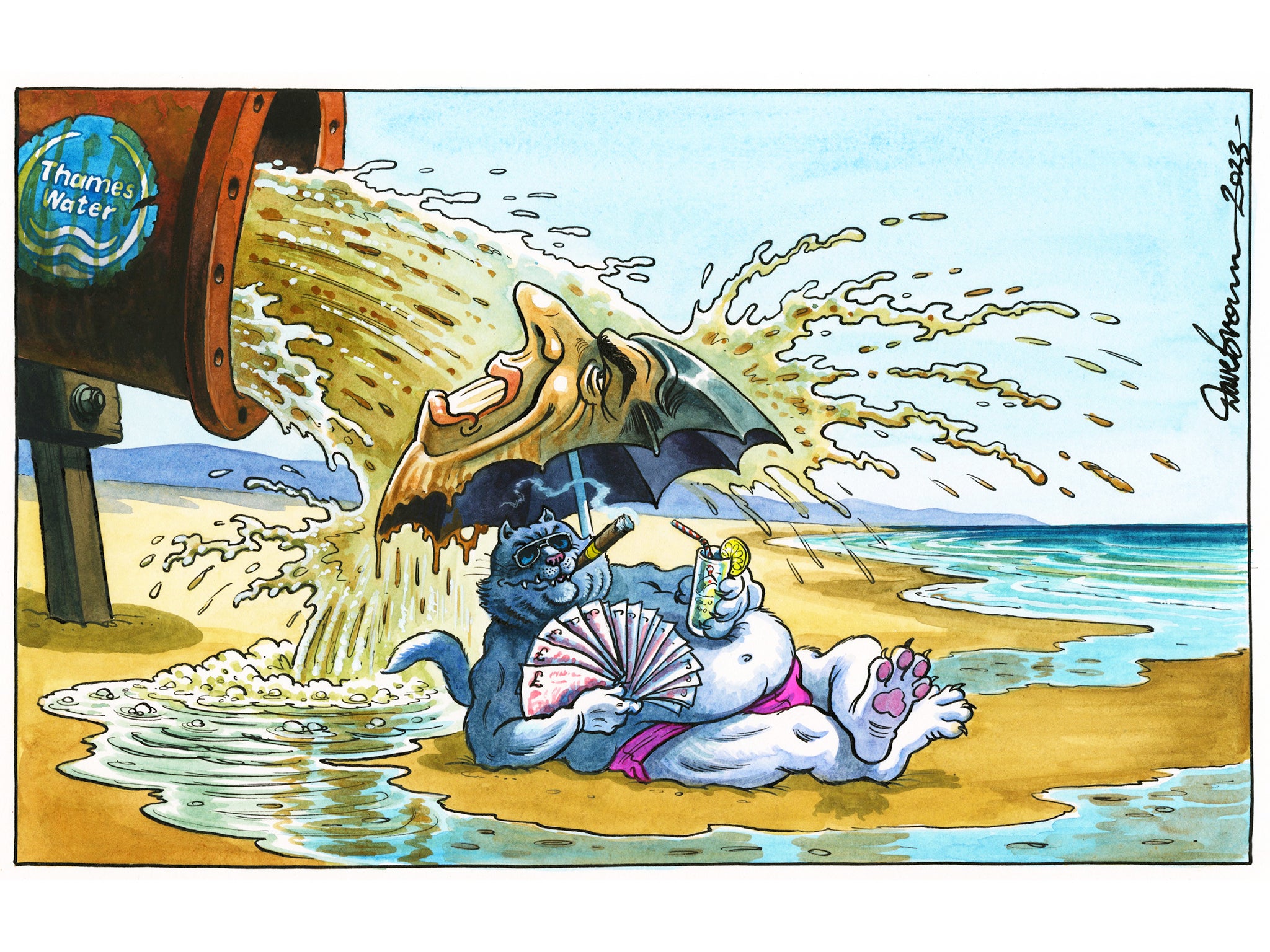Gutter politics: Why the Tory water crisis is embarrassing for Labour, too
Renationalising Thames Water will leave a bitter taste for voters, says Sean O’Grady


Rishi Sunak’s government has held emergency talks over the fate of England’s biggest water supplier which is struggling under huge debts despite last year recording pre-tax profits of £493.5m.
What is the government doing about it?
It depends who you ask. Environmental quality and resilience minister Rebecca Pow answered an Urgent Question in the Commons tabled by Labour. Given all the reporting about imminent rescue and renationalisation of Thames Water, Pow gave the impression that nothing much was wrong and that the government wouldn’t need to get involved: “Water companies are commercial entities, and it is for the company and its investors to resolve any possible issues,” she said. “Government, of course, is confident that Ofwat as the economic regulator for the water industry is working with any company that is facing financial distress.”
There seems to be some mixed messaging within government. Pow is a relatively junior minister at Defra. Meanwhile, business secretary Kemi Badenoch has declared herself “very concerned” and has said: “We need to make sure Thames Water as an entity survives…Ofwat is being kept fully informed on progress of the company’s turnaround [plan] and engagement with shareholders. Thames Water continues to maintain a strong liquidity position, including £4.4 billion of cash and committed funding.”
Either way, ministers will be reluctant and embarrassed to take back into public ownership a company their party privatised. They will probably use a “special administrative regime” to camouflage the company’s return to the public sector.
One thing voters will find repulsive is any straight subsidy to Thames Water at the cost of billions of pounds to taxpayers but with no ownership stake in return.
Why is Thames Water in trouble?
It can’t afford to service its substantial (£14bn) debts as interest rates are being jacked up – something that could hit other highly leveraged businesses as well as households with large mortgages.
Its previous executives loaded the company with too much debt, paid themselves excessive dividends and bonuses and left it with too little to meet the demands of investment and maintenance to tackle leaks and sewage spills.
Are the Tories now the party of public ownership?
Over the past 13 years they’ve taken a number of troubled rail and energy companies into public ownership, albeit unwillingly. The pattern seems to be one of “privatised profits, nationalised losses” in which private shareholders reap bumper dividend payouts in good times but debt is dumped on the taxpayer when losses begin. No government, however devoted to free markets, can allow trains to stop running or taps to run dry; in this sense, utilities and public services are “too big to fail”.
Will nationalisation be a vote winner for Rishi Sunak?
It’s hard to see how it could be. For one thing, privatisation was a great symbol of Thatcherism and the Conservative belief in the ability of free enterprise to deliver good, affordable services. That claim looks a little sickly at the moment. Not only do voters in England’s rural and coastal constituencies blame the Tories for sewage pollution, but water charges are set to be ramped up by 40 per cent or more to pay for much-needed renewal of the pipes and infrastructure.
In a broader sense, an emergency nationalisation of such an important and high-profile company, serving 15 million households – 27 per cent of the UK population – merely adds to the sense of a government not in control of events. And for internal hard-right Tory critics of Mr Sunak, it will confirm their dim view of him and his supposed centrist instincts.
Who is responsible for sewage discharges into rivers and on beaches?
Anthony Browne, Conservative MP for South Cambridgeshire, has pointed out that the Tories are only “guilty” of uncovering the issue. “The discharges were only meant to happen rarely in emergencies, but the problem got worse over the decades, as the population grew, producing more sewage, and more development meant more rainwater running into drains rather than soaking in the soil. But there were no campaigns because no one knew how much discharges were happening, and because it was not raw sewage it was difficult to see. Over decades, successive governments ignored the issue. We didn’t know how bad things were until this government forced water companies to monitor the discharges. When the Conservatives came to power in 2010, only 7 per cent of sewage works monitored their discharges. The government insisted on monitors being installed – it is now over 90 per cent and will be 100 per cent by the end of this year.”
However, there is a settled view that sewage discharges have happened under the Conservatives’ watch, and that their policy of privatisation was to blame. The issue disproportionately affects Tory coastal and rural constituencies – greatly to the benefit of Liberal Democrats, Labour and the Greens.
What are the drawbacks of nationalising Thames Water?
The company’s £14bn debt would be added to the existing £2.5 trillion or so of UK national debt if the taxpayer ends up in majority control. On the other hand, the public will own the assets of Thames Water.
Where does this leave Labour?
In an odd place. Under Jeremy Corbyn, the party promised to take rail, mail, energy and water into public ownership, and Keir Starmer adopted the pledge during his leadership campaign. However, shadow chancellor Rachel Reeves scrapped all that last year, with a vow that Labour would not be “spending billions of pounds on nationalising things”. In our topsy-turvy political world, it’s possible that the Tories will renationalise Thames Water and Reeves will try to re-privatise it if she gets into power; however, a quick sale might be problematic given the firm’s debts and troubles, aside from any ideology.






Join our commenting forum
Join thought-provoking conversations, follow other Independent readers and see their replies
Comments